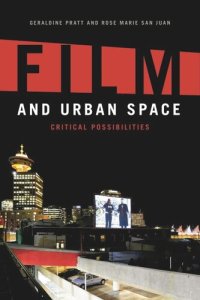
Ebook: Film and Urban Space: Critical Possibilities
Author: Geraldine Pratt, Rose Marie San Juan
- Year: 2014
- Publisher: Edinburgh University Press
- Language: English
- pdf
Traces the dynamic relationship between film and city
How are the political possibilities of film related to urban space? What are the ethical implications of representing urban space on film? How does the use of urban space help to theorise film?
Film and Urban Space: Critical Possibilities traces recurring debates about what constitutes film’s political potential and argues that the relation between film and urban space has been crucial to these debates and their historical transformations. The book demonstrates that in the attempt to follow certain prescriptions – shooting on location, disrupting normalizing time, experimenting with memory, interlinking the spaces of screen and cinema – films invariably use the relation between film and urban space as a kind of laboratory, testing anew received prescriptions but invariably encountering new opportunities and new limits. A wide range of key films, from Dziga Vertov’s 1929 Man with a Movie Camera to Jia Zhangke’s 2008 24 City, are discussed in depth, each offering an argument for how the encounter between specific manifestations of modern urban space and politically engaged film strategies has served to challenge the status quo and stimulate critical thinking.
An insightful and thought-provoking read, Film and Urban Space: Critical Possibilities presents scholars and advanced students in Film Studies with a compelling argument for the impact of urban space in creating film’s critical political and ethical possibilities.